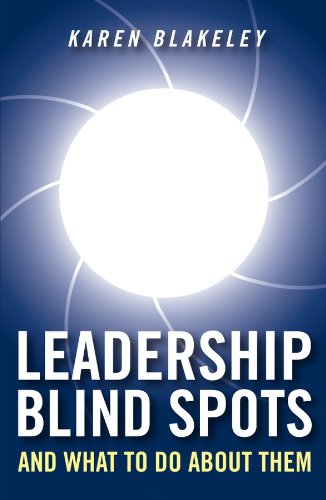As a leader you cast light and shadow across not only your team but your organisation. That’s one heck of a responsibility. No matter how talented a leader you are, how experienced or self-aware, you will have blind spots. They’re inevitable, and every leader has them to some degree.
On the other hand the more awareness and learning you get under your belt, the less ability your blind spots will have to rock the leadership boat. And that level of awareness and learning depends on curiosity. If, as a leader, you’re not the least bit curious about your blindspots you’ll find yourself less able to lead effectively, and that lack – however subtle – will mean the people you’re leading will trust you less than they otherwise might.
It makes a lot of sense to become aware of your leadership blind spots, examine them, learn from them, and therefore mitigate the negative power they potentially have over you and those you lead.

What is a blindspot?
As a leader, clarity of vision is vital. When you have a blindspot you’re unable to see clearly, incapable of seeing the breadth and nuances of the ‘reality’ of a situation because your own inaccurate expectations or preferences get in the way. How you make sense of it will be limited by your inherent filters.
The Theory of Incongruency says plenty of potentially valuable new ideas get binned because leaders are blind to the value of ideas that don’t fit their expectations about what works and what doesn’t. Perhaps you have a blindspot around conventional business wisdom which is less relevant to your context now but it still guides the business’ growth strategy. You might alternatively be so fixed on a new idea that you cease to take note of any data that might wobble your commitment to it.
Every leader can potentially trip themselves and their organisation up by not recognising the bias of perspective that their blindspots can cause.
Blindspots come in all shapes and sizes!
As a leader you might have a blindspot about the people you lead, or even about an individual’s capabilities. You might have blindspots around stakeholders, the culture and functions of your organisation, the commercial and financial aspects of it, the markets you operate in, or the tactics and plans you’re so invested in creating. Your blindspots can ambush you anywhere, at any time.
Karen Blakey on ‘Leadership Blind Spots’
In her book Leadership Blind Spots and What to do About Them, Karen Blakey says:
“Blind spots cause us to interpret cues around us in ways that preserve our existing ideas and behaviours and prevent us from adapting and learning.”
“Blind spots prevent us from adapting our behaviour, our attitudes and our understanding at times when it is imperative to do so.”
And that’s absolutely spot on, statements that clearly reveals how very unhelpful our leadership blind spots can be.

The book is very helpful, as it explores the matter in depth, supporting the message with case studies and practical ways to work with blindspots. If you, as a leader, want to take your leadership skills to the next level, then this book is well worth reading. We can recommend it. Karen’s approach will challenge and support you to explore your own blindspots and do everything you can to reduce their influence.
Otto Sharmer on egosystems and ecosystems
From a strong system’s organisational and community point of view, Otter Sharmer’s thinking is also interesting. It examines the ways leaders can connect systems by listening in-depth. His YouTube video reveals a fascinating and challenging perspective on leadership blindspots. In Sharmer’s world listening is the most important part of the process, an effective way for even marginalised people operating at the very edge of a system to be heard.
In his opinion the best leaders learn to listen, know how important it is to keep listening and stay open, suspend judgement, reject cynicism, and ignore the voice of fear. All this helps them move away from an egosystem state of awareness towards an understanding of the ecosystem. This is much better since ego system awareness comes with limited understanding and inevitably contains blindspots.
As Otto explains through the written introduction to his Video:
“Social transformation and the path to a green, regenerative, and just economy requires a new collective leadership capacity that enables communities to innovate at the scale of the whole system. This new leadership capacity involves all key stakeholders in a journey of sensing and actualizing emerging future opportunities. To do so, leaders need to progress from egosystem awareness to ecosystem awareness.”
You can see the video here and learn more about his approach.
How to work positively with your blind spots
Gaining greater awareness of your leadership blindspots means you can do something about them before they trip you and others up. Luckily there are plenty of ways to keep alert to them.
Here are some suggestions:
- Know who you are – a good level of self awareness and self knowledge will help you pin down your blindspots faster and more effectively
- Look for patterns than might indicate there’s a hidden blindspot in operation – does the same kind of thing keep going wrong? Can you pin down the real reason?
- Know exactly who you need around you to help you become the most effective you can be, surrounding yourself with people whose skills and expertise complement and add to yours
- Ask people for honest feedback about inconsistencies they might see in your leadership style and values
- Be tenacious and brave enough to illuminate your own inconsistencies whenever you can and do something about them, acting on any feedback received
- Don’t just assume. Test every assumption using reliable data
- Encourage a constant flow of different perspectives and fresh ideas
- Build open, honest relationships with key people at every level in your organisation who can help you avoid blindspots
- Welcome challenge from others who think differently from you and keep an open mind
- Maintain a keen spirit of enquiry, keep being curious and willing to learn
- Get in the habit of being more eco-centric and taking note of the whole organisation system and the subsystems that exist within it
- Listen, listen and listen again – your leadership life and effectiveness probably depend on it
Let’s uncover your blindspots together
If you would like to explore your blindspots and make a real step change in your leadership impact, get in touch. We would be pleased to talk.
About us:
We create the space for leaders to step back, think clearly, and navigate complexity with confidence. By sharpening the narrative that drives decisions, teams, and performance, we help leaders move forward with clarity and impact. Our approach blends deep listening, incisive challenge, and commercial focus—strengthening leadership at every level, from business transformation to boardroom decisions.
“We share resources that help coaches deepen their practice and expand their impact. The articles on this site are designed to spark fresh thinking, offer practical tools, and support the continuous growth of coaches at every stage. “
Jude Elliman
Founder
Our Core Approach:
We work with leaders to sharpen their thinking, strengthen their leadership, and navigate complexity with confidence. Our approach is built around three core areas:
Narrative Coaching – Working with the stories that shape leadership, teams, and organisations.
Commercial Focus – Cutting through complexity to drive clear, strategic decisions.
Challenge & Space – Asking the right questions while creating the space to reflect and grow.
Through this, we help leaders drive transformation, align teams, and make high-stakes decisions with clarity and impact.
